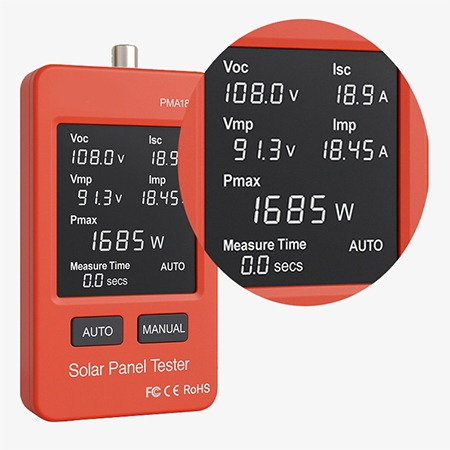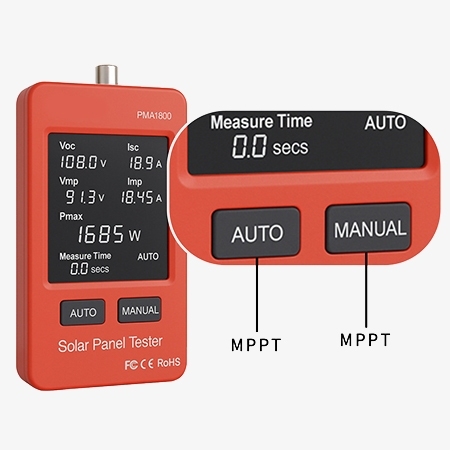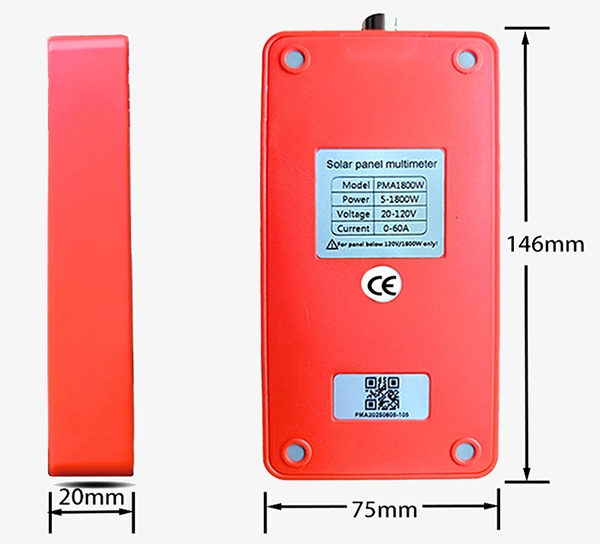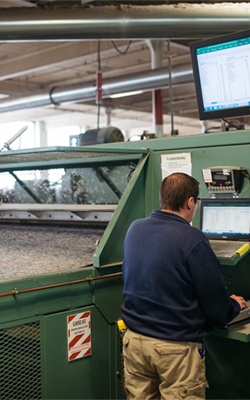The solar panel tester is a professional tool designed for accurately measuring the performance of photovoltaic (PV) panels and solar power systems. This solar panel multimeter can measure key metrics such as maximum power point (Pmax), open-circuit voltage (Voc), and short-circuit current (Isc). Ideal for solar installers, maintenance engineers, and researchers, this tester supports reliable field testing under real sunlight conditions.

High-Definition LCD Display with Built-in Backlight
- High-Definition LCD Display: Equipped with a clear, easy-to-read HD LCD screen, allowing users to view voltage, current, and power data at a glance.
- Built-in Backlight: The backlit display ensures excellent visibility even in bright sunlight or low-light environments, ideal for outdoor testing.
- Real-Time Measurement: Accurately displays instantaneous voltage, current, power, and efficiency for quick performance evaluation of solar panels.
- Portable Design: Compact and lightweight, making it easy to carry and ideal for on-site installation, maintenance, and inspection work.

Automatic/Manual Measurement Switching
- Auto/Manual Measurement Modes: Supports both automatic and manual testing, allowing users to freely switch modes according to their testing needs for greater flexibility.
- Automatic MPPT Tracking: In auto mode, the tester can automatically track the Maximum Power Point (MPPT) to obtain the most accurate performance data.
- Manual Adjustment Option: The manual mode enables technicians to control the testing process precisely, ideal for detailed analysis and experimental use.
- Flexible Operation: With one-button mode switching, users can easily adapt to different testing scenarios—from quick field checks to comprehensive lab measurements.
- High Testing Efficiency: The combination of auto and manual modes improves work efficiency while ensuring measurement accuracy and reliability.
Dimension

Application
SISCO solar panel testers are used to evaluate the performance and efficiency of photovoltaic (PV) panels and solar systems. They are widely used in the solar energy, electrical, renewable energy industry and manufacturing. The are also applied in manufacturing and quality control, construction projects, and research institutions to evaluate panel performance, ensure system safety, and verify product quality.

Electrical

Renewable Energy Industry

Manufacturing

Solar Energy
| Model | SISCO-DM-PMA800 | SISCO-DM-PMA1800 |
| Power | 800W | 1800W |
| Current | 0-35A | 0-60A |
| Voltage | 12-60V | 20-120V |
| Display | OLED display | |
| Backlight | Yes | |
| Power Supply | Photovoltaic panel power supply | |
| Dimensions | 148*75*21mm | |
| Weight | 420g | |
Q1: What is a solar panel tester used for?
A1: A solar panel tester is used to measure and evaluate the performance of photovoltaic (PV) panels and solar power systems. It checks key parameters such as voltage, current, power output, efficiency, and insulation resistance to ensure that the panels are working correctly. Technicians use it to verify installation quality, diagnose faults, detect underperforming panels, and maintain the overall efficiency of solar energy systems.
Q2: Do I need a solar panel tester for installation?
A2: Yes. A solar panel tester is highly recommended during installation to verify wiring connections, polarity, and panel output performance. It ensures that each panel and string operates correctly before being connected to the inverter or grid, helping to prevent installation errors, identify defective panels early, and guarantee the system’s safety and efficiency.
Q3: Can a solar panel tester detect faulty panels?
A3: Yes. A solar panel tester can effectively detect faulty or underperforming panels by measuring and comparing key parameters such as voltage, current, and power output. If a panel shows significantly lower readings than expected, the tester helps identify issues like damaged cells, poor connections, shading problems, or internal defects, allowing technicians to locate and replace faulty units quickly.
Tips: Is a solar panel tester suitable for all types of solar panels?
Yes, a solar panel tester is generally suitable for testing all major types of photovoltaic (PV) panels, including monocrystalline, polycrystalline, and thin-film modules. These testers are designed to measure key electrical parameters—such as open-circuit voltage (Voc), short-circuit current (Isc), and maximum power (Pmax)—which are common across most panel technologies.
However, it’s important to check the tester’s voltage and current range before use, as some panels, especially high-power or commercial-grade modules, may exceed the limits of standard testers. Many advanced solar panel testers also support bifacial, half-cut, and PERC panels, allowing accurate performance analysis even for next-generation solar technologies.
In summary, as long as the tester’s specifications match the electrical characteristics of your panels, it can be used effectively across residential, commercial, and industrial solar systems to ensure proper operation and verify efficiency.
Thank you for buying industrial test and measurement equipment on SISCO.com, all products sold by SISCO and the partner cover a 12 months warranty, effective from the date of receiving the products.
What is covered?
SISCO is responsible for providing free spare parts, and free technical support to assist the customer to repair the defective products until the problem is solved.
What is not covered?
- Product purchased from anyone other than a SISCO store or a SISCO authorized reseller.
- Expendable parts.
- Routine cleaning or normal cosmetic and mechanical wear.
- Damage from misuse, abuse or neglect.
- Damage from use of parts other than SISCO approved.
- Damage from use outside the product’s usage or storage parameters.
- Damage from use of parts not sold by SISCO.
- Damage from modification or incorporation into other products.
- Damage from repair or replacement of warranted parts by a service provider other than a SISCO authorized service provider.
- Damage caused by the application environment not meeting the product usage requirements and the failure to perform preventive maintenance.

 Solar Panel Tester User Manual
Solar Panel Tester User Manual